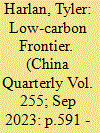| Srl | Item |
| 1 |
ID:
192622


|
|
|
|
|
| Summary/Abstract |
China's west has long been framed as an undeveloped frontier, set apart by poverty and a resource-based economy. Since the 2000s, however, utility-scale renewable energy infrastructure has expanded rapidly in western China, promising local economic benefits tied to national low-carbon transition. This paper contends that these benefits have been precarious and unevenly distributed. I argue that utility-scale renewable energy has remade western China as a “low-carbon frontier,” a resource-rich region that generates low-carbon value for the national green economy. I highlight three features of low-carbon frontiers: they are constructed as spaces of exploitable low-carbon resources, creating an investment boom; they are enclosed through new land arrangements and infrastructure construction, rapidly and with little coordination; and they are reliant on external markets and policy decisions, entrenching dependency. These conditions make it difficult for frontier regions to capture sustained economic development benefits from the boom in the absence of persistent central state supports. I analyse these features by comparing two sets of technologies with similar, but ultimately diverging, trajectories: small and large hydropower in China's south-west, and solar and wind in the north-west.
|
|
|
|
|
|
|
|
|
|
|
|
|
|
|
|
| 2 |
ID:
113778


|
|
|
|
|
| Publication |
2012.
|
| Summary/Abstract |
Although China's Uyghurs have progressively engaged in informal trade following economic reforms, in recent years a small group of corporate Uyghur entrepreneurs have positioned themselves in more formal industries where they hold a cultural advantage. However, we argue that the clustering of firms and a lack of experience and capital limits entrepreneurs' ability to compete with established Han businesses. This restricts Uyghur economic participation more generally, contributing to labour-market inequalities and ethnic tension in cities like Urumqi. The authors conclude that government support for Uyghur entrepreneurs is a crucial step to strengthen economic development and reduce ethnic tension in the region.
|
|
|
|
|
|
|
|
|
|
|
|
|
|
|
|